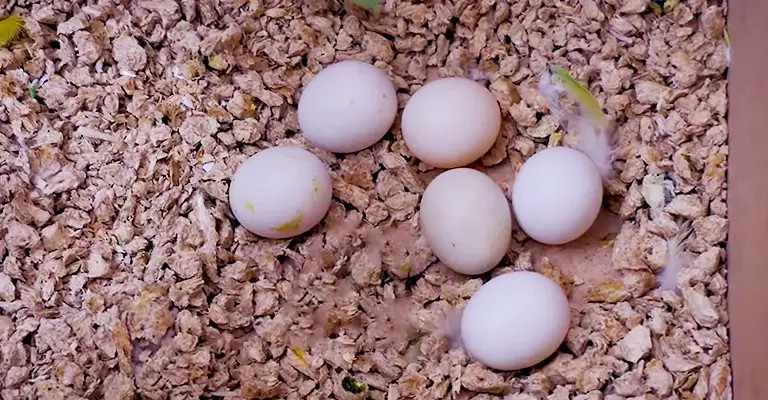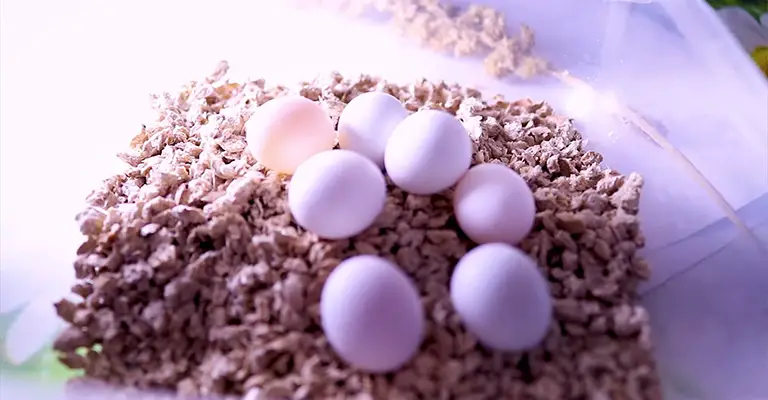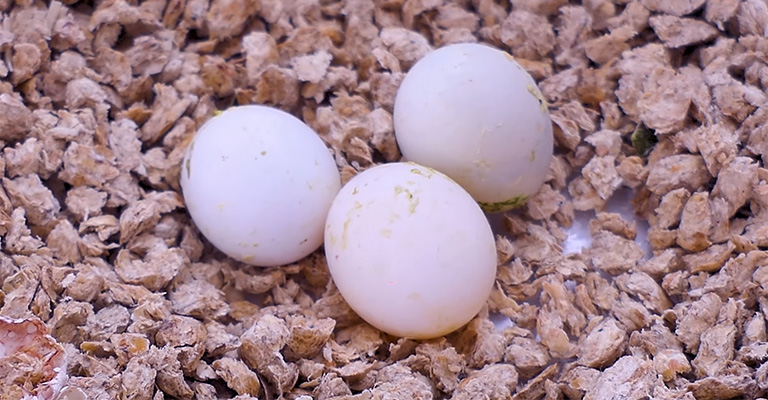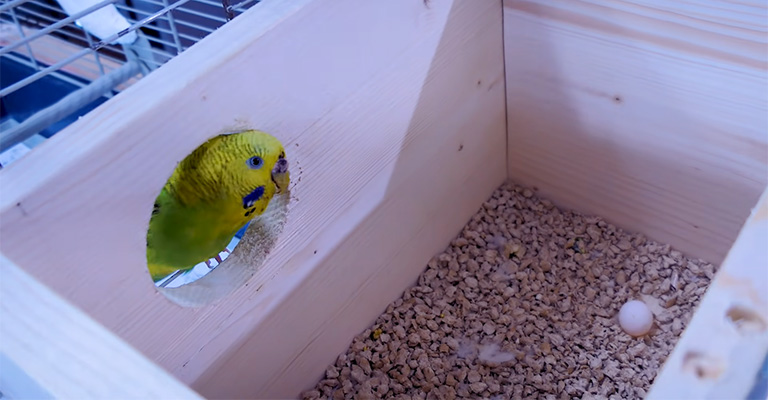Just like any other bird, budgies also lay eggs and hatch them. If you have a pair of budgies, you may encounter the challenge of dealing with unwanted eggs. Budgies are prolific breeders, and if the conditions are favorable, they may lay eggs even without a mate.
So, what to do with unwanted budgie eggs? You can simply leave the eggs as they are or remove them from the nest. Some prefer to donate the eggs or sell them to other bird enthusiasts.
Let’s dive in and explore various options for handling unwanted eggs.
![What to Do With Unwanted Budgie Eggs? [Resolving the Dilemma]](https://theworldsrarestbirds.com/wp-content/uploads/2023/06/What-to-Do-With-Unwanted-Budgie-Eggs.jpg)
How Many Eggs Budgies Lay at a Time?
Budgies typically lay eggs in clutches, with each clutch consisting of multiple eggs. On average, budgies lay between 4 to 8 eggs per clutch.
However, the exact number can vary from bird to bird. If you have a female budgie and there is no male budgie present, she can still lay eggs, but these eggs will be infertile.
What to Do If You Don’t Want Budgie Eggs?
If you don’t want budgie eggs, here are some steps you can take:
Separate the Eggs
As soon as you notice budgie eggs in the nest and you don’t want the budgies to breed, you can carefully remove the eggs. Use clean hands or wear disposable gloves to avoid transferring any contaminants to the eggs.
Try Egg Replacement
To discourage further egg-laying, you can consider using dummy eggs or replacement eggs made from materials like wood, plastic, or ceramic.
These can be placed in the nest to simulate real eggs. Budgies may perceive the presence of eggs as a cue to continue laying, so replacing them can help break the cycle.
Adjust the Environment

Budgies are more likely to breed if they have access to a suitable nesting area, such as a cozy box or a nesting site. Remove or modify the nesting materials and rearrange the cage or aviary to discourage breeding behavior.
This can include removing potential nesting sites or reducing the amount of daylight exposure, as budgies are more likely to breed during longer daylight hours.
Provide Distractions
Budgies may be more inclined to lay eggs if they are bored or lack mental stimulation. Provide plenty of toys, perches, and interactive activities to keep them engaged and entertained. This can help redirect their energy away from breeding behavior.
Consult A Veterinarian or Avian Expert
If you’re having difficulty preventing budgies from laying eggs or if you have concerns about their reproductive health, it’s advisable to consult a veterinarian or avian expert. They can provide guidance specific to your budgies’ situation and help you develop a suitable plan to manage their breeding behavior.
How to Handle Budgie Eggs?

Handling budgie eggs requires care and attention to ensure their safety. Here are some guidelines for handling budgie eggs:
Wash Your Hands
Before handling budgie eggs, make sure to thoroughly wash your hands with mild soap and warm water. This helps prevent the transfer of bacteria or contaminants to the eggs, which could harm the developing embryos.
Use Clean Gloves
If you prefer an extra layer of protection or if you’re concerned about hygiene, you can wear clean disposable gloves while handling the eggs. This further reduces the risk of transmitting any harmful substances.
Handle Eggs Gently
Budgie eggs are delicate, so handle them with extreme care to avoid cracking or damaging the shells. Hold the eggs gently in your cupped hand, supporting their weight and avoiding excessive pressure.
Avoid Sudden Temperature Changes

Budgie eggs are sensitive to temperature fluctuations. Do not expose the eggs to extreme heat or cold, as it can harm the developing embryos. Keep the eggs at a stable temperature, similar to the surrounding environment.
Do Not Rotate the Eggs
Unlike some bird species, budgies do not require egg rotation during incubation. Therefore, it’s best to avoid rotating the eggs unless directed otherwise by a veterinarian or avian expert.
Return Eggs Promptly
If you have temporarily removed the eggs from the nest for any reason, it’s important to return them as soon as possible. Budgie parents have a strong instinct to incubate their eggs, and prolonged separation can harm the embryos’ development.
Note: It’s best to handle budgie eggs as minimally as possible to reduce stress and minimize the risk of damage. If you have any concerns or questions about handling budgie eggs, consulting with a veterinarian or an experienced avian breeder would provide expert advice tailored to your specific situation.
How To Keep The Bird From Laying More Eggs?

To prevent your budgie from laying more eggs, you can take several steps to create an environment that discourages breeding. Here are some points with detailed explanations of how to achieve this:
Remove Nesting Materials
Budgies require suitable nesting materials to build a nest and lay eggs. You can reduce the likelihood of egg-laying by removing any potential nesting materials from the cage, such as shredded paper, hay, or cloth. With the necessary materials, budgies are more likely to begin breeding.
Adjust Lighting and Temperature
Budgies’ reproductive cycles are influenced by how much daylight they receive. By providing them with a consistent lighting schedule of 10-12 hours of daylight and 10-12 hours of darkness, you can help regulate their hormonal activity and minimize the chances of egg-laying.
Maintaining a stable temperature within their comfort range (around 70-80°F or 21-27°C) can also help discourage breeding behavior.
Avoid Encouraging Courtship Behavior
Budgies engage in courtship behavior as a prelude to breeding. Actions such as providing them nesting boxes, placing mirrors in their cage, or playing with mating-related sounds can trigger their reproductive instincts. Avoid these stimuli to reduce the likelihood of egg-laying.
Limit Food Variety
A varied diet can stimulate budgies’ breeding behavior. By limiting their food variety and ensuring a balanced diet, you can minimize the hormonal fluctuations that lead to egg-laying.
Focus on providing a high-quality seed mix, fresh vegetables, and occasional treats while avoiding excessive protein-rich foods like eggs or meat.
Increase Cage Activity and Enrichment
Keeping budgies mentally and physically engaged can distract them from reproductive behaviors. Provide a spacious cage with plenty of perches, toys, and interactive elements.
Regular out-of-cage exercise and social interaction can also help redirect their energy and reduce the desire to lay eggs.
Monitor Light Exposure Outside of the Cage
Budgies can be sensitive to lighting conditions outside of their cage as well. If they are exposed to natural daylight or bright artificial lights for extended periods, it may disrupt their reproductive cycle. Ensure that their cage is placed in an area with limited exposure to direct sunlight and avoid excessive lighting during nighttime.
Consider Hormonal Treatments:
In severe cases where a budgie repeatedly lays eggs despite environmental modifications, hormonal treatments may be an option.
Consult an avian veterinarian to discuss the potential benefits and risks associated with hormonal interventions, as they should only be considered a last resort.
Remember, providing a healthy and enriching environment for your budgie, irrespective of their reproductive behavior, is essential.
Regular veterinary check-ups, a balanced diet, and ample exercise and mental stimulation opportunities are crucial for their overall well-being.
FAQs
Yes, budgies can lay eggs without a male partner. These eggs are infertile and will not hatch into baby budgies.
Budgie eggs typically take about 18 to 21 days to hatch. However, if the eggs are infertile, they will not hatch.
While budgie eggs are edible, it is generally not recommended to eat them. Budgie eggs are small and have a high yolk-to-white ratio, making them less suitable for human consumption compared to chicken eggs.
Removing budgie eggs can trigger the budgie to lay more eggs as a replacement. To prevent this, you can replace the real eggs with artificial ones to trick the budgie into thinking the eggs are still there.
Budgies can lay eggs every few days, typically laying one egg every other day until they complete a clutch.
Final Words
So, that was all about what to do with unwanted budgie eggs. Unwanted budgie eggs can be a challenge for bird owners, but there are several ways to handle this situation.
Whether you choose to leave the eggs alone, remove them, or take preventive measures to discourage breeding, it’s important to ensure the welfare of your budgies.
Remember, if you have concerns or are unsure how to handle the situation, seek advice from professionals in avian veterinary care or experienced budgie breeders who can provide guidance tailored to your specific circumstances.